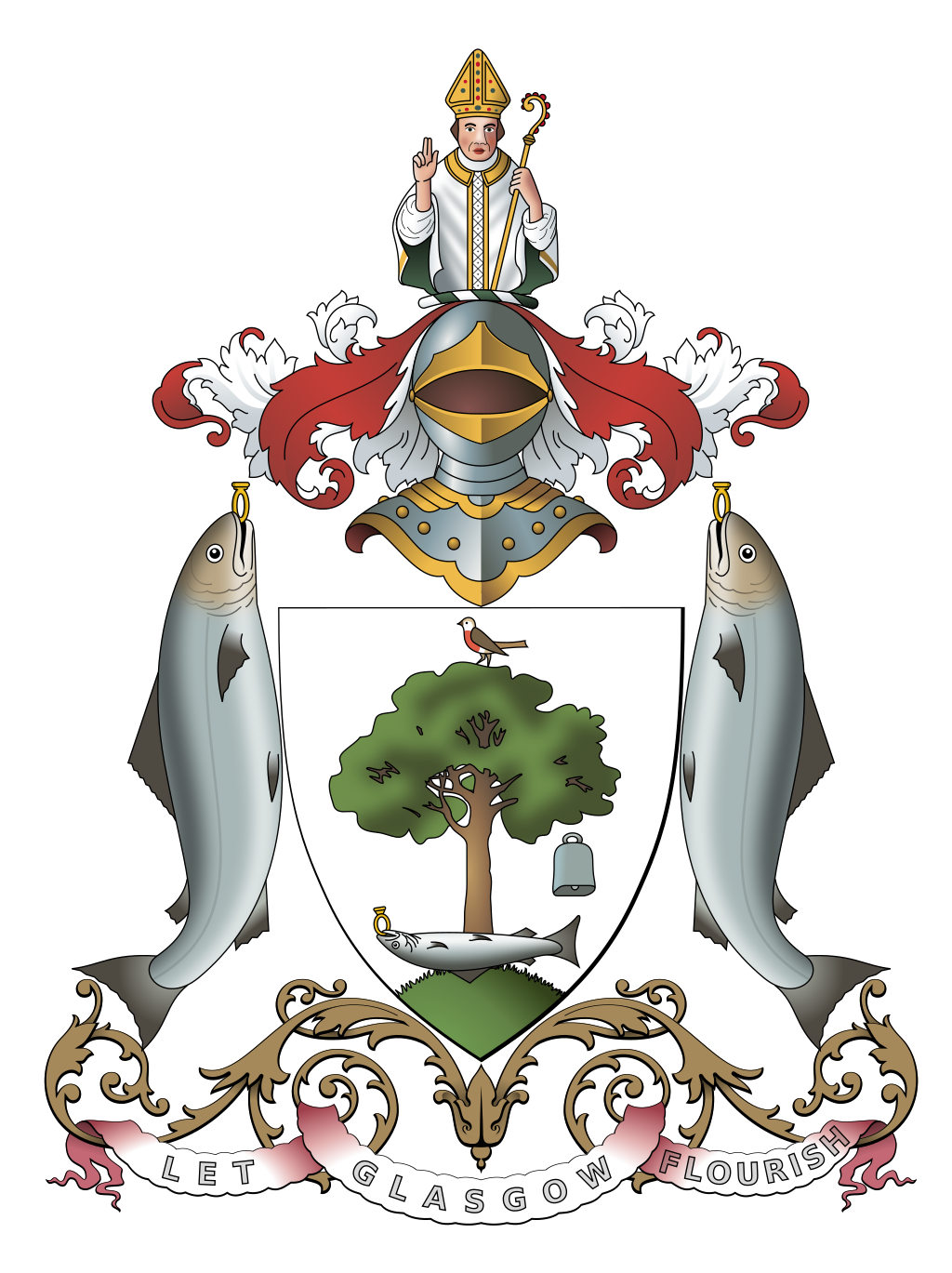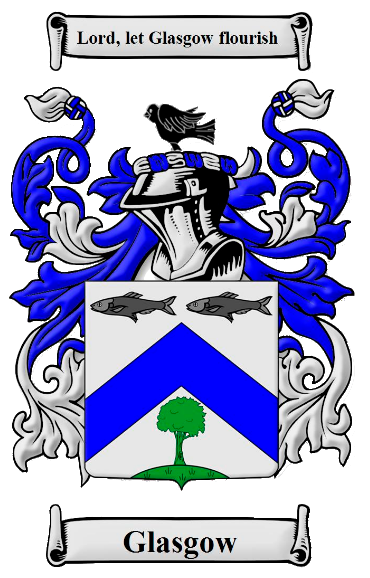

The Coat of arms of Glasgow is the official emblem of the City of Glasgow and has been in use in various forms since 1866.
History
The Lord Lyon first granted a patent for a coat of arms for the city of Glasgow in 1866. Before this time, there were at least three official coats of arms in use. The first seal to use all the elements associated with the coat of arms was that of the Chapter of Glasgow, in use from 1488-1540, but they did not appear in something close to their present combination until 1647. Since it was first granted, various versions of the symbol have been in use. The current version of the coat of arms dates from April 1996, when it was granted following a local authority reshuffle.

Symbolism
The symbols appearing on the coat of arms represents the life and legends of Saint Mungo, the patron saint of Glasgow, and are often remembered by the following poem:
Here is the tree that never grew
Here is the bird that never flew
Here is the fish that never swam
Here is the bell that never rang
Here is the ring that never wed
Here is the book that’s never read
The tree referred to in this poem is depicted as an Oak tree in the coat of arms, but popular versions of the story refer to a holly branch. The story goes that he was once left in charge of watching a holy fire by Saint Serf, but the fire was put out by some other boys jealous of St. Mungo after he fell asleep. Upon awakening, St. Mungo was able to miraculously light a new fire from the tree branch. The bird referred to in the poem is a robin which was tamed by St. Mungo's teacher, St.Serf which was revived by St. Mungo after it was killed by some of his classmates. Three fish are depicted in the coat of arms, each with a ring in its mouth. This references the story St. Mungo being able to retrieve a lost golden ring belonging to Queen Languoreth of Strathclyde from the mouth of a fish fished from the River Clyde. The bell is an item which may have been given to St. Mungo by the Pope, but this is not known for sure. In any case St. Mungo's bell was a notable institution in Glasgow. The bell no longer exists, with a replacement having been purchased in 1641. St. Mungo himself also appears on the coat of arms as the crest above the imagery described above, with his hand raised as if to give a benediction.
Motto on the Glasgow coat of arms
The motto depicted on the coat of arms is "Let Glasgow Flourish". This is a shortened version of the phrase "Lord, let Glasgow flourish by the preaching of the word" which St. Mungo is said to have used within one of his sermons.
From Wikipedia, the free encyclopedia https://en.wikipedia.org/wiki/Coat_of_arms_of_Glasgow
The ancestors of the Glasgow family lived among the Strathclyde-Briton people of the Scottish/English Borderlands. Glasgow is a name for someone who lived in the city of Glasgow on the river Clyde in the county of Renfrew (first recorded in 1116 as Glasgu), or from either of two minor places with the same name in Aberdeenshire. The origins of the place name are uncertain, it may come from the Welsh glas, or "gray," and cau, meaning "hollows."
Early Origins of the Glasgow family
The surname Glasgow was first found in Renfrewshire (Gaelic: Siorrachd Rinn Friù), a historic county of Scotland, today encompassing the Council Areas of Renfrew, East Renfrewshire, and Iverclyde, in the Strathclyde region of southwestern Scotland, where they held a family seat from very ancient times, some say well before the Norman Conquest and the arrival of Duke William at Hastings in 1066 A.D.

Glasgow Spelling Variations
Spelling and translation were hardly exact sciences in Medieval Scotland. Sound, rather than any set of rules, was the basis for spellings, so one name was often spelled different ways even within a single document. Spelling variations are thus an extremely common occurrence in Medieval Scottish names. Glasgow has been spelled Glassgow, Glasgow, Glassgaw and others.
Suggested Readings for the name Glasgow
The Glasgow Family of Adams County, Ohio: A Genealogy of the Descendants of Robert Glasgow (1749-1839) and His Wife Rosanna of Bush Creek, Adams County, Ohio by David Faris.
Source: House of Names https://www.houseofnames.com/glasgow-family-crest©2000- 2023 Swyrich Corporation, all rights reserved.
The name Glasgow is a very old and distinguished one. It has been
recorded even before the Norman Conquest and the arrival of William
Duke of Hastings in 1066. The name has been spelled
Glasgow,Glassgaw,Glassgow, Glascho,Glascu,and Glascou. The first
records of the name were found in Renfrewshire,which is five miles
west of Glasgow.
Fun fact:
Glaschu
is gaelic for Glasgow.
